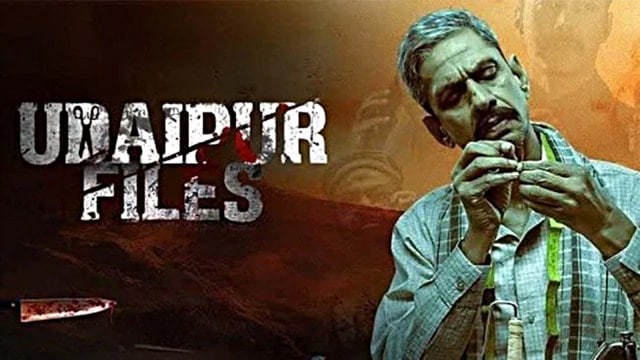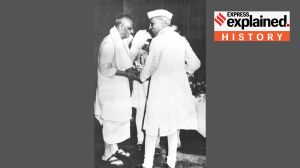Udaipur Files: What should prevail between right to free speech and right to life, asks SC
Makers of the film ‘Udaipur Files: Kanhaiya Lal Tailor Murder’ had moved the Supreme Court challenging a Delhi High Court order staying its release.
 The movie stars Vijay Raaz, who plays tailor Kanhaiya Lal Teli who was killed in 2022. (Source: File)
The movie stars Vijay Raaz, who plays tailor Kanhaiya Lal Teli who was killed in 2022. (Source: File)The Supreme Court on Wednesday posted for July 21 an appeal by makers of the film Udaipur Files: Kanhaiya Lal Tailor Murder, challenging the Delhi High Court’s order that stayed its release till the Centre takes a call on the matter. The court said it would wait for the outcome of the Centre’s statutory hearing on the matter scheduled for Wednesday.
The bench of Justices Surya Kant and Joymalya Bagchi also raised the question as to what should prevail in a case of conflict between the Fundamental Right to Free Speech and Expression under Article 19 and the Right to Life and Liberty under Article 21 of the Constitution.
The court noted that the hearing by the Centre against the certificate granted by the Central Board of Film Certification (CBFC) is scheduled for Wednesday afternoon, and said, “We expect that the (Centre’s) Committee will decide the revision petition immediately without any loss of time.”
Section 6 of the Cinematograph Act, 1952, gives the Centre revision powers over the decisions of the CBFC.
The high court order had come on a plea by Maulana Arshad Madani, principal of the Darul Uloom Deoband, and others. They contended that the movie, purportedly based on the murder of tailor Kanhaiya Lal by alleged Islamic fundamentalists in 2022, is “replete with dialogues and instances that had led to communal disharmony in the very recent past and thus carry every potential to again stoke the same communal sentiments”.
Senior Advocate Gaurav Bhatia, appearing for the filmmakers, also submitted that the producer and director of the movie, as well as the son of Kanhaiya Lal were getting continuous threats to their lives.
Taking note of the matter, the bench granted them “liberty to immediately approach the Superintendent of Police/Commissioner of Police of the area, who shall assess threat perception”. It directed that “in case merit is found in apprehension, necessary steps be ensured to prevent harm to their lives.”
Bhatia said he is questioning the legality of the Delhi High Court’s order as he had a valid certificate issued by a statutory body.
At the outset on Wednesday, the bench sought to know the status of the revision hearing. Senior Advocate Kapil Sibal, appearing for the petitioners who had approached the high court against the film, said the hearing is slated for 2.30 pm.
Justice Kant then remarked, “That hearing is taking place today…should we not (wait). We can have the advantage of Union’s view in the matter.”
The judge added, “Suppose they suggest there should be more cuts… There can be for or against points… Had it been a case that the Centre was not taking up the matter, we could have… We can wait for a day or two since the government is taking it up. All of you are entitled to be heard by the Union. Raise all contentions there. We will keep the petitions pending.”
The court also took up for hearing a petition by one of the accused in the murder case – Mohammad Javed – who alleged that allowing its release would prejudice his right to a fair trial in the case.
Senior Advocate Menaka Guruswamy, who appeared for Javed, said the film portrays two sub judice issues: the Gyanvapi dispute and the Kanhaiya Lal murder.
“The movie portrays the judiciary as well in a certain way. The movie is bordering on hate, and bringing the judiciary into disrepute. There is much at stake. They can’t claim free speech to violate fair trial or lower the judiciary’s reputation,” she submitted.
Bhatia urged the bench to hear the matter urgently. He contended that the high court’s order was erroneous as there is a presumption of legality once a film is certified by the CBFC.
Justice Kant said, “Now there is an intervention to the extent that a statutory authority, prescribed by the same statute under which you have obtained this certificate…contemplates to form its own view pursuant to a revision petition… Let us see what view they will form.”
The judge added, “Ultimately, if you stand vindicated, and you are able to make out a case that because of the pendency of the litigation, you have suffered losses, we will see how you can be compensated.”
Bhatia, however, said “that cannot be a substitute to my right which I want to exercise under Article 19 of the Constitution.” To this, Justice Kant said, “We will only repeat what we said yesterday. If there is a fight between Article 19 and 21, should we support 19 or 21?”
On Tuesday, hearing the case of Youtubers Ranveer Allahabadia and others, Justice Kant had sought to emphasise that Article 21 would prevail over Article 19 in a case of competing interests. “Right to dignity also emanates from the right which someone else is claiming… Article 19 can’t overpower Article 21… Article 21 must prevail if any competition takes place,” he had said.
Bhatia said there are various judgments of the Supreme Court which say that judicially trained minds do not get influenced by films or new items.
Agreeing, Justice Kant said, “You are right. Prime facie, we can be with you that our judicial officers are not schoolgoing children or adolescents that they can be affected by movies or misled by dialogue in a movie to decide a case… The most important thing is the sense of detachment they carry… We have no doubt about that. But at the same time, if a person has some apprehension, he needs to be heard.”







